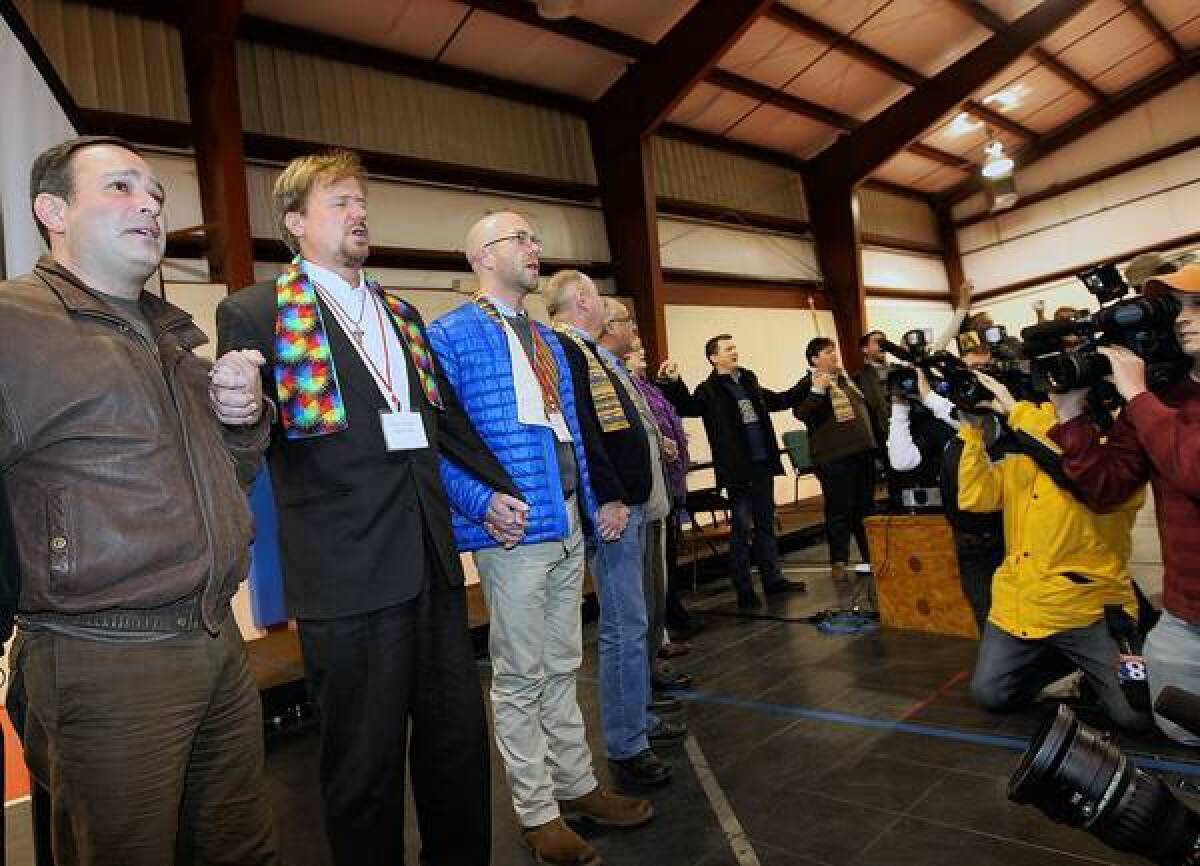Methodist pastor, suspended for performing gay marriage, weighs options

LEBANON, Pa. — It had been six years since the Rev. Frank Schaefer officiated at the wedding of his son, Tim, to another man — long enough that he rarely thought about the ceremony anymore.
Long enough that he didn’t expect it to become an issue for parishioners at his church in this quiet, rural area in eastern Pennsylvania, especially since he’d made a point of not telling them about it.
But Schaefer’s United Methodist Church does not tolerate same-sex marriage, and Schaefer has become the latest poster child in the fight between reformists and traditionalists, who after learning of the wedding took Schaefer to a church court this month and won. After an emotionally charged trial, a jury of fellow pastors convicted Schaefer of breaking church law and suspended him for 30 days for performing the April 2007 marriage of his son in Massachusetts.
Now, he faces a choice: loyalty to church doctrine, or loyalty to his son and to other gay men and women who might ask him to perform marriages in the future.
“I’m going to have to make a very, very hard decision,” a weary-looking Schaefer said Thursday, three days after his conviction.
As he wondered aloud about his next move, though, it sounded as if the decision had been made.
“I just have to speak for my children now, and for all of my LGBT brothers and sisters,” said Schaefer, 51, whose case is the latest to embroil the United Methodist Church in a debate that is likely to broaden as same-sex marriage gains acceptance.
A day after Schaefer’s conviction, Illinois joined 15 states and the District of Columbia in legalizing same-sex marriage. President Obama announced his support for gay marriage last year, and Americans who accept same-sex marriage have increased from 35% in 2001 to about 50% now, according to the Pew Research Center.
Other Protestant denominations in the U.S. — including the Presbyterian Church, Episcopal Church and Evangelical Lutheran Church of America — have wrestled in recent years with the role gay people should play in church life.
The 12-million-member United Methodist Church has punished clergy in the past for being openly gay or for performing same-sex marriages, including in 2005 when a Pennsylvania pastor, Beth Stroud, was defrocked for being a lesbian. In 2011, a church jury in Wisconsin suspended the Rev. Amy DeLong for having officiated at a gay wedding.
More cases are pending, including that of Thomas Ogletree, the retired dean of Yale Divinity School. Like Schaefer, Ogletree performed the wedding ceremony for his gay son, last year in New York.
“We recognize that there are divisive opinions within the church,” said Bishop Rosemarie Wenner, president of the United Methodist Council of Bishops, the church’s executive branch. “This issue requires honest and ongoing conversation, as well as prayers as we seek greater understanding.”
Wenner said there are signs “of hope in a challenging time” as those in the church engage in “prayerful conversation.”
There is no sign of imminent change, though. At the church’s last general conference in 2012, delegates upheld language that declares homosexuality “incompatible with Christian teaching.”
Reformists say the stance is hurting church U.S. membership, which has been declining since the 1980s. But membership is growing overseas, particularly in Africa and Asia, which is helping steer the church’s conservatism.
It’s a conservatism that Schaefer shared growing up in Germany in an evangelical home. But Schaefer, who still speaks with a hint of German accent, said his studies at Princeton Theological Seminary in New Jersey opened his eyes to a different way of thinking. So did his discovery that Tim, 16 at the time, was gay. Two more of Schaefer’s four children are also gay.
“I evolved through my seminary education. I changed, and now I can’t go back,” said Schaefer, who with his ruddy complexion and sandy blond hair looks more like a ski bum than an anguished clergyman. “That’s not my job. My job is to serve people.”
Eleven years ago, Schaefer was assigned to the Zion United Methodist Church of Iona in Lebanon, a city of about 25,000 with a skyline dominated by church steeples. Its phone book lists at least 78 churches in the former steel-producing town, where Colonial-era row houses downtown give way to rolling farmland and modern subdivisions on the outskirts.
The formal complaint against Schaefer that led to the trial followed months of murmuring among church members that the pastor had presided over his gay son’s wedding. The congregant who filed the complaint, Jon Boger, a lieutenant commander in the Navy, would not comment after the trial, but he testified during the case that, just as he had taken an oath to obey military law, Schaefer had taken an oath to follow church law.
Schaefer’s supporters said the timing of the complaint was suspicious. Boger filed it shortly after his mother left her job as the church choir director after a dispute with Schaefer.
Schaefer’s critics, though, say they had long had issues with the pastor’s liberal slant and had worried that under his leadership, parishioners were leaving and taking much-needed money with them.
Earlier this year, a group calling itself Concerned Parishioners of Zion UMC of Iona sent a petition to Bishop Peggy Johnson of the church’s Eastern Pennsylvania Conference asking that Schaefer be replaced “until his trial determines his future.” A letter accompanying the petition said, “Families and friendships are being torn apart by the discord within the church.”
Last week, when the guilty verdict against Schaefer was read, some people sobbed. Boger, who said he understood Schaefer’s devotion to his son, walked up to the pastor, shook his hand, and assured him the complaint had not been personal.
Schaefer says he believes Boger and has no hard feelings. “We’re all people,” he said. “Those who took the stand against me — if I meet them, I respect them. I still love them. I consider them personal friends.”
atimes.com”>tina.susman@latimes.com
More to Read
Sign up for Essential California
The most important California stories and recommendations in your inbox every morning.
You may occasionally receive promotional content from the Los Angeles Times.











